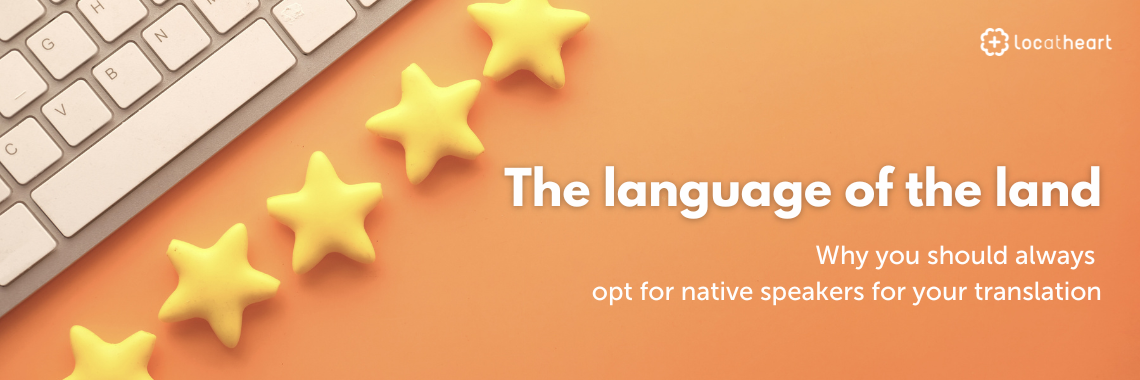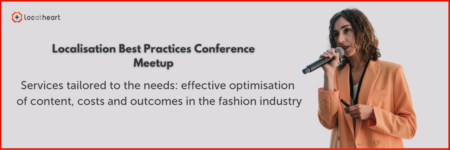The language of the land. Why you should always opt for native speakers for your translation
How do you like your water? Offered a glass, Ted Lasso, the titular character of a comedy-drama TV series, says, “I like my water like Kyle Irving likes his Earth. Flat.” It’s a reference to American basketball player Kyle Irving who has stated that he believes Earth is indeed flat. In Poland, he’s not a very known figure, so in one version of the Polish subtitles, the joke was thoroughly localised, “Lubię, gdy woda jest jak życie bezdzietnych lambadziar – bez bombelków.” The pun here is that bąbel means a bubble, but bombelek is a derogatory term for a bothersome child of parents with a sense of entitlement. Lambadziara refers to women dressing and acting provocatively (can be autoironic). So, water should resemble the life of an easy-going girl, with no bubbles/children.
This level of localisation requires more than just proficiency in the target language – a rich colloquial vocabulary and deep understanding of the local context are also necessary. In other words, it requires a native speaker.
Who is a native speaker?
As Nigel Love and Umberto Ansaldo put it, “If you were born and brought up from birth to speak a given language, for preference in a family where the parents or other adults had the same experience with the same language, then you are a native speaker of that language, which is your mother tongue” (2010, 589). Other definitions go even further, and Joseph J. Lee (2005, 155) lists a whole set of conditions that are necessary to identify someone as a native speaker:
While sometimes the idea of a native speaker is contested on the basis of the world becoming more and more cosmopolitan with time – and monolingual individuals becoming somewhat of a rarity, especially in younger generations – the bottom line is this: being raised within a specific language community and later on soaking up its culture by living in a country the community is part of gives clearly defined linguistic advantages that directly influence one’s work as a translator. This, in turn, directly influences the quality of the services and texts provided. And by “influences” we mean “improves”.
Why native speakers provide superior translations
It’s one thing to learn a language, but it’s a different thing to live surrounded by it. Native speakers take in the language from day one; one might be tempted to say that the mother tongue is passed down along with the mother’s milk. While it’s perfectly possible to acquire linguistic skills with training and education, a native speaker will always be one step ahead of the non-native one. There will always be a unique idiosyncrasy permeating through their texts, a “+1” bonus, if you will, to the quality of their output. You will get “good enough” translations from non-natives, but if you’re striving for excellence – you simply have to go native. You might pay a little extra for native speaker services, but you’re getting exactly what you pay for – extra quality of a premium product.
Native speakers excel in every area:
Language consciousness
Native speakers are very conscious of their language; they know what could be said in given circumstances, but also what couldn’t be said. A non-native might produce an expression that seems fine from a grammatical point of view; it’s just that you wouldn’t hear it from a native, ever. The other side of the consciousness coin is that natives unconsciously, intuitively feel when something sounds just about right – and when something is off, jarring to the ear or striking a false note. So when somebody uses the phrase sacré bleu, they are giving away their status as a non-native French speaker, because the French just don’t say that. Just like “mon Dieu is more common in English headlines about France than in the mouths of the actual French” (Devlin 2021).
Vocabulary
Education, training and exposing oneself to a given culture through digital and printed media (e.g., by reading books or watching films) and/or traveling is the way to go if one wants to build a strong vocabulary base and expand it. Then again, native speakers hold the privileged position of being simply bombarded – regardless of whether they actually want it or not – by words and phrases of a given language, starting from the early days of their infancy and continuing through the successive stages of their personal and professional development. They spend less time searching for a proper (right? suitable?) word and can provide fluent, elaborate and colourful content, depending on the needs of the client.
Cultural setting
While the age of the internet has made the world a bit smaller, and a single tweet might go viral and be on the lips of the global community in a matter of hours, there are tonnes of local context that might slip past an individual not living in a particular place. Bombelki and lambadziary are part of memes and internet discussions in Poland, but these words are little known outside the country. There’s also the matter of local varieties of the language – or slang. A pissed American is very angry, but a pissed Brit is drunk (or loaded, as a Yankee would say).
Up-to-dateness
Language is ever-evolving, and keeping up both with its changes and developments in the country it is used in should be another point of focus for any translator and content creator. There’s also the sensitive issue of words not only becoming outdated or changing meaning but even being discarded because they are deemed offensive. Again, native speakers can’t be beaten here simply by the virtue of actually living in a particular place and witnessing the evolution first-hand.
Will AI and machine translations replace human translators?
Even though the recent developments of AI-based tools have forced us to rethink the role of the translator in the present and future world, the answer to the above-question is “no”. Large language models used for machine translation are improving but they have still a long way to go before achieving human-level intelligence. While content generated by a computer system can be a cost-effective option for generic or low-quality output, this is definitely not the solution if you care about delivering high-quality content for your customers. However, these tools can be useful in two ways: 1) providing a base or a starting point for translators and editors to work on, and 2) serving as advanced searchable knowledge repositories, although this is still a moot point as there are recorded and confirmed issues when it comes to AI and fact-checking. All in all, we are closely monitoring the current developments and testing AI offerings (like ChatGPT) with the purpose of optimising our processes, but as of right now, human translations reign supreme.
locatheart and native speakers
We firmly believe that translations should always be delegated to native speakers who should translate content only into their mother tongue. To be considered as a potential collaborator, apart from being a native speaker, a linguist has to have appropriate education and experience, and live in the country where a given language is used. Services of a professional of this type will cost more when compared with less skilled, non-native content writers. And yet, quality is always our main concern and we remind our clients that this higher price is the price of excellence.
In-house linguists
A selected group of veteran linguists forms our in-house language team. We expect them to deliver texts with great flow, style and panache. To do that, they need to have excellent command of Polish and English, as well as possessing the necessary (and broad) cultural competence indispensable to their work in translation, editing, proofreading and copywriting.
Pivot language
All the source content is translated into English – the pivot language – before we hand it over to translators of various languages. This enables us to cut down on the costs and smoothen the process, as we don’t have to look for translators fluent in a pair of sometimes uncommon languages – we always provide the English master version. If necessary, content undergoes transcreation rather than simple translation) (e.g. in different hemispheres summer holidays are celebrated in different months, so while Brazilians are getting tanned, Poles are putting up their Christmas decorations, and so on).
Is being a native speaker enough?
No, in itself it is not enough; although it is a necessary requirement for a linguist and the foundation of locatheart’s strategy. It’s brilliant if an individual knows the Parisian argot and has lived in the French capital for their whole life, but that still has to be supported by appropriate education and experience. When these conditions are met, we can deliver content that sounds natural and will positively impact your brand in a given market (and a given language). And that’s what this is all about, n’est-ce pas?
Need to translate something? Go native and go locatheart
At locatheart, we believe that investing in high-quality content always yields higher rewards and translates (ha!) into increased profits, better brand awareness and stronger bonds between a company, its product, and its customers. To achieve that, we employ a dedicated in-house team of linguistic professionals and cooperate with experienced native speakers from all over the world to help you tackle any project you might need to have translated. Words can be a powerful force. Learn how this force can support your business. Reach out to us!
Sources:
Devlin, T. M. (2021, January 27). 9 French phrases native speakers never use. Babbel Magazine. Retrieved April 18, 2023, from https://www.babbel.com/en/magazine/french-phrases-native-speakers-never-use.
Lee, J. J. (2005). The Native Speaker: An Achievable Model? Asian EFL Journal, 7(2), 152–163.
Love, N., & Ansaldo, U. (2010). The native speaker and the mother tongue. Language Sciences, 32(6), 589–593. https://doi.org/10.1016/j.langsci.2010.09.003.







Leave a Reply